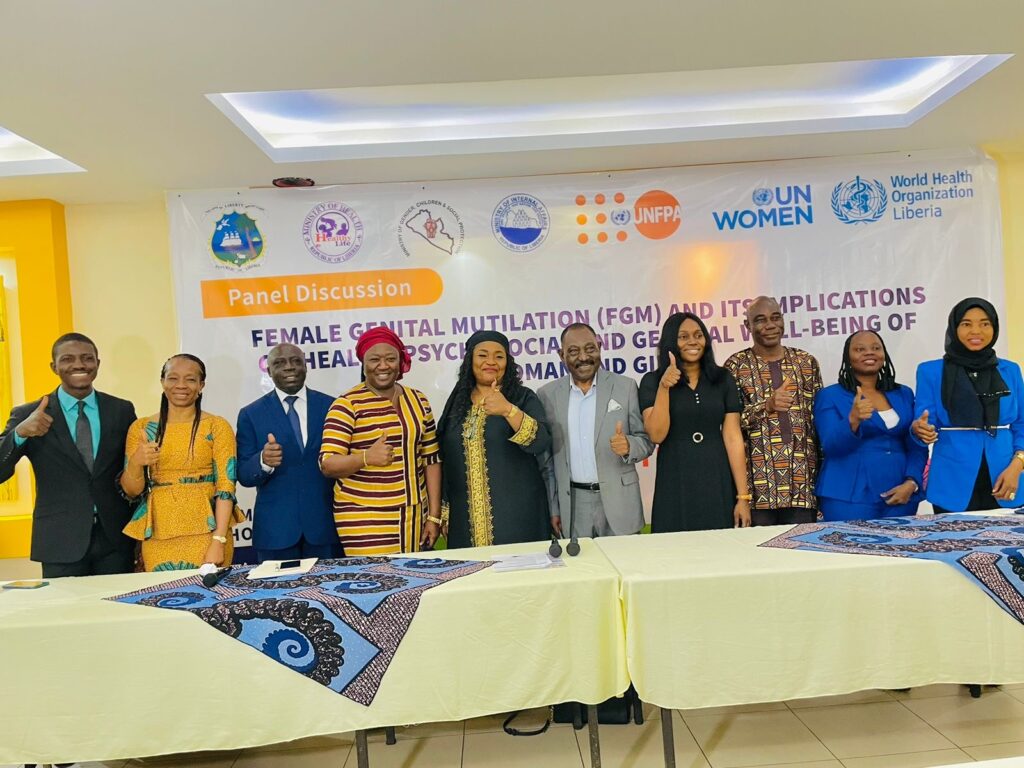“Initiation Without Mutilation” WHO and Partners Craft New Means of Traditional Practices in Liberia

By: Laymah Kollie
Monrovia-April 6,2024: Approximately a year since Female Genital Mutilation (FGM) was permanently banned in Liberia, National and International Partners have been on the verge of finding suitable means through which Liberia’s culture and tradition can be practiced and or observed.
This pursuit has led UN Women Liberia, European Union and others to sponsor Zoes and traditional women with alternative livelihood programs.
FGM remains a deeply entrenched cultural practice and another form of violence against women and girls through cutting. The practice has affected over 200 million girls and women who have undergone FGM world wide. The practice has immediate and long term health consequences such as infection, severe pain, child birth complication and even death. The practice is recognized internationally as a violation of human rights and reflect a deep rooted gender inequality and an extreme form of discrimination.
In Liberia, it is reported that 31.8% of Liberian women and girls continue to live with the consequences of this harmful practice with many more at risk. Most of them underwent forced initiation.
Several global instruments have called on state parties, organizations and communities to take action to end the practice in their respective country. To further elevate the call for the abolishment of the practice of FGM throughout the world the UN General Assembly adopted Resolution A/RES/67/146 on December 20, 2012 calling upon States, the United Nations system, Civil Society, and all stakeholders to observe February 6 each year as International Day of Zero Tolerance for FGM. The Resolution seeks to intensify global efforts to eliminate FGM and raise awareness against the practice. Again, let all of us be reminded that FGM is recognized as a violation of the human rights of women and girls reflecting deeply rooted inequality between the sexes and constitutes an extreme form of discrimination against women.
However, as the quest for a more suitable practice continues, the World Health Organization in collaboration with UN Women Liberia, the Ministry of Health and others on Thursday April 4,2024 hosted a daylong panel discussion on Female Genital Mutilation (FGM) and its implications on health, psychosocial and general wellbeing of women and girls.
Remarking at the event, Madam Comfort Lamptey, Country Representative of UN Women Liberia stated that the plan is not to eradicate traditional practices in Liberia but to practice tradition without FGM.
“Initiation without mutilation” she said.
Also, Dr. Clement Peter, WHO Representative to Liberia stated that the conversation around FGM has been a long term issue, it’s about time more work be done to enhance fruitful results.
“We should work beyond this conversation, we need to do more about the issue”
Furthermore, Senator Dabah Varpilah of Grand Cape Mount County speaking at the occasion, informed partners to change some of the people carrying the message of FGM. She thinks, if Liberia should go past this, FGM victims and practitioners should be at the forefront of preaching the message of new practices in the culture and traditions of the country.
“Let us attentively identify our messengers well”
Meanwhile, During the engagement, health workers highlighted complications that comes with the practice of FGM to women and girls in Liberia. While traditional leaders, alongside the Ministry of Internal Affairs and Gender provided government’s efforts to mitigating FGM in Liberia.
In 2018, a one-year ban against Female Genital Mutilation (FGM) through an Executive Order was issued by the former President, Her Excellency Madam Ellen Johnson Sirleaf and the impact was not extensive – the ban was not largely publicized; the Executive Order was not extensively enforced with limited monitoring; the ban was considered ineffective as there were no penalties for violators. Studies conducted in Liberia indicate that the practice of FGM has some economic gains benefitting female practitioners or Zoes. In this case, the ban did not address the economic benefits of female practitioners, as there was no form of economic alternative programs, thereby, creating a loophole in its full implementation.
Several policies suspending the practice was adopted by the National Council of Chiefs & Elders of Liberia in June 2019 for a period of a year and another on February 4, 2022 for a period of 3 years. On February 6, 2023, the national chairman of the traditional Council, Chief Zanzan Karwor issued a ban on the practice throughout the Republic of Liberia during the observance of the International Day of Zero tolerance on FGM in Sonkay Town, Montserrado County.
The ban was followed by the performance of community engagement and ceremonial and traditional rites in 5 counties, namely Montserrado, Grand Cape Mount, Nimba, Bong and Lofa County. There are 6 counties namely, Bomi, Gbarpolu, Margibi, Grand Bassa, Rivercess and Grand Gedeh that will need to have these traditional rites implemented.



